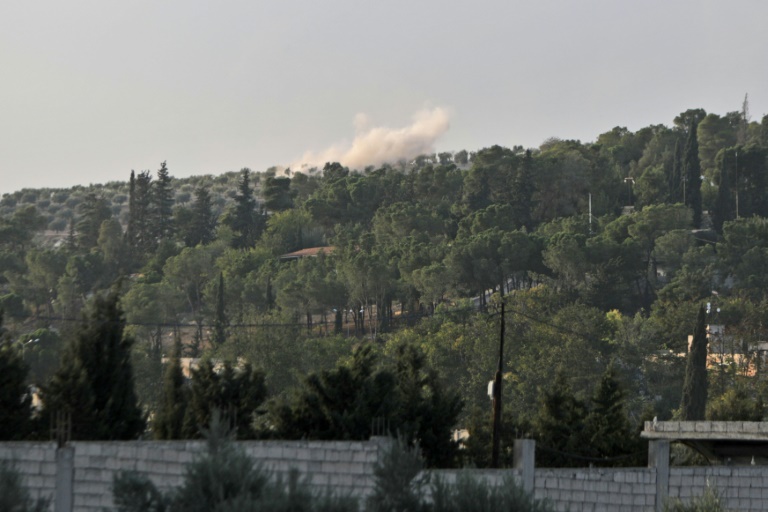Former Qaeda affiliate’s Syria advance: what we know

Smoke rises on the horizon as Al-Qaeda-linked fighters of Hayat Tahrir al-Sham make gains in Syria’s Aleppo province from feuding Turkish-backed rebels
Beirut – Al-Qaeda’s former Syria affiliate is gaining ground from rival rebels in Syria’s Turkish-held north on the heels of some of the deadliest inter-rebel fighting in the region in years.
Here is what we know of the deadly flareup, which is altering the balance of power in parts of Syria that still evade government control after more than a decade of war.
– Who is involved? –
Syrian rebel groups opposed to President Bashar al-Assad’s government are mostly confined to the northwestern region of Idlib and northern parts of Aleppo province, near the border with Turkey.
Turkey, which has carried out successive cross-border operations in Syria since 2016, has carved out a zone of control in areas near the border with the help of rebel proxies that have repeatedly fought for influence.
They include the Al-Jabha al-Shamiya group, which was forced out of the city of Aleppo following bloody battles with government forces in 2016, and the hardline Jaysh al-Islam — once considered the leading faction in the Eastern Ghouta suburbs of Damascus, a former rebel bastion.
Other groups were formed in the north and include the Sultan Murad Division and the Al-Hamza Brigade.
The neighbouring Idlib region is dominated by the Hayat Tahrir al-Sham alliance, led by Al-Qaeda’s former Syria affiliate.
Turkey has never publicly backed the hardline group but is believed to coordinate with its forces, which control the key Bab al-Hawa border crossing.
– What is happening? –
On October 8, clashes erupted in the town of Al-Bab in the north of Aleppo province between Al-Jabha al-Shamiya and the Al-Hamza Brigade over accusations that the latter was behind the murder of a local activist.
Such murders are not rare in the volatile border region where Turkey-backed groups are widely accused of a range of human rights abuses.
But the ensuing clashes quickly spread to other areas and drew in other factions, including HTS, leading to the deadliest inter-rebel flareup in the area in years, according to the Britain-based Syrian Observatory for Human Rights.
HTS, which is widely seen as the strongest and best organised of Syria’s rebel groups, threw its weight behind the Al-Hamza Brigade in its battles with Al-Jabha al-Shamiya and Jaysh al-Islam.
Following less than a week of fighting, HTS captured the key region of Afrin, in the northwest of Aleppo province, in an unprecedented advance.
“HTS controls all of Afrin, including all administrative institutions, and it is managing security and overseeing checkpoints,” said Suraj al-Deen al-Shami, a rebel spokesman.
An abortive truce between the warring factions at the weekend granted HTS full control over Afrin and other areas of the Turkish-held north.
In return, HTS and allied rebel fighters would halt their attacks.
But the agreement quickly unravelled with clashes resuming this week amid a fresh advance by HTS and its allies.
HTS has since inched closer to the town of Azaz near the Turkish border, following 10 days of fighting that have killed nearly 60 people, including 10 civilians, according to the Observatory.
– What’s Ankara’s role? –
HTS, which is sanctioned by the UN as a terrorist organisation, formally broke ties with Al-Qaeda in 2016 and incorporated a number of smaller Syrian rebel factions in a major re-branding effort.
Through battles and truces with other rebel groups, it won dominance of the last major rebel bastion in Idlib in 2019.
It has since presented itself as the mainstay of Syria’s opposition which has been ground down by more than a decade of war with Assad’s forces.
The group’s latest advances near the border with Turkey are its most significant outside Idlib province and have triggered concern in the United States.
“We are alarmed by the recent incursion of HTS, a designated terrorist organisation, into northern Aleppo (province),” the US embassy said in a statement.
“HTS forces should be withdrawn from the area immediately.”
But many believe HTS could not have advanced without the at least tacit approval of Ankara, which has done little to stop the latest fighting.
“So far, there has not been an official, explicit position from Turkey, and this may indicate their approval,” said rebel spokesperson Shami.
“Perhaps Turkey does not agree, but it accepts it as a fait accompli,” he said.
It remains unclear what HTS dominance of the Turkish-held rebel enclaves will mean for Ankara, which has recently signalled that it is more open to a rapprochement with Damascus.
Nawar Oliver, a military expert at the Turkey-based Omran Center for Strategic Studies, said Ankara’s inaction had given HTS room to manoeuvre.
“HTS wants to send a clear message that it is capable of asserting control over the region,” Oliver told AFP.
